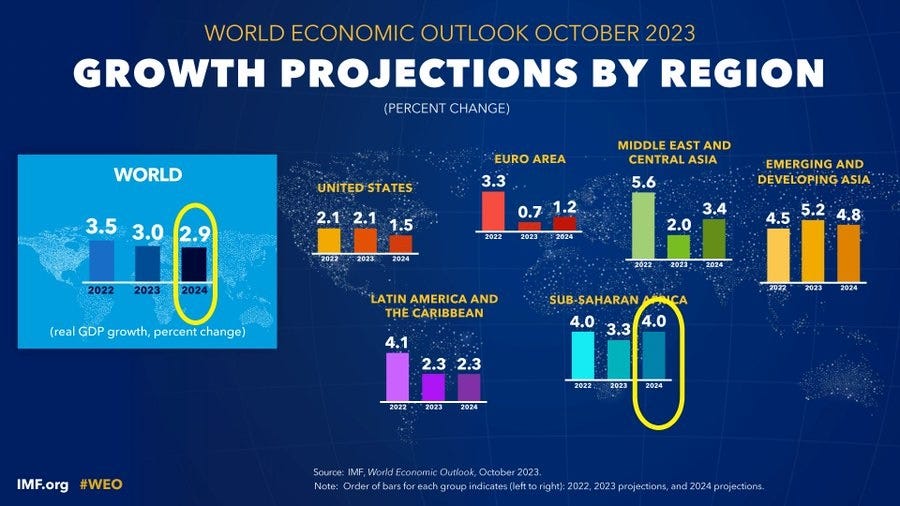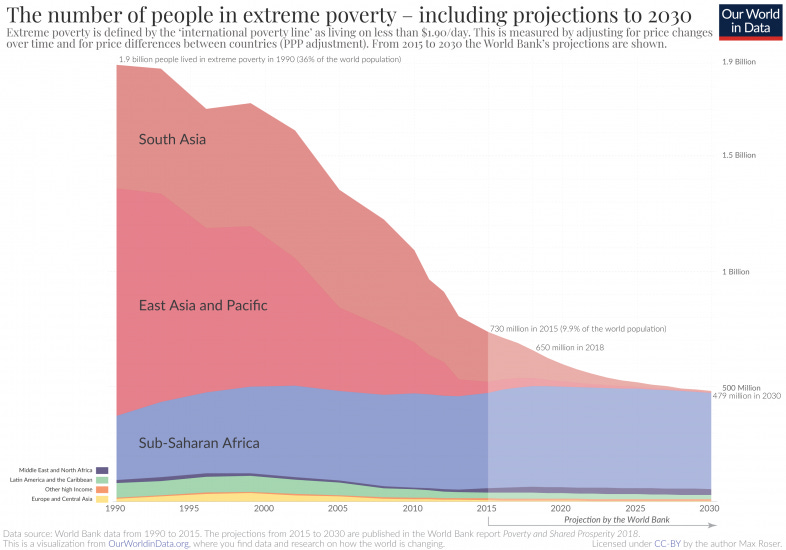
I’m flying back from Taiwan today! I used to write on planes, but they made the seats too narrow, so my productivity has been reduced. Oh well. So instead, here’s a repost from the Noahpinion archive.
Africa has been mostly out of the news in the U.S. these days. But if you think about the rest of this century, and what that’s going to look like, it’s impossible not to think about the world’s second-largest continent. The two reasons, simply put, are 1) population, and 2) poverty. Africa’s fertility rate is shrinking, just like everywhere else, but it started doing so much later. So population momentum is going to make Africa VERY populous by the time it peaks (which some forecasters think will happen at around the end of the century). Here’s an infographic from an IMF report:

You’ll notice that these estimates are quite a bit lower than the ones in my first graph in the post below. This is because Africa’s fertility rates have been falling a lot more than people expected. But even with these lower estimates, Africa is projected to be absolutely huge by the end of the century. And its fraction of the young population will be far higher still. There will come a time, not too long from now, when countries around the world are clamoring for African migrants instead of trying to keep them out.
The other reason Africa is important is poverty; it’s now clear that Africa will be the last major world region to escape a subsistence standard of living. The question of whether and how it can escape this fate is the subject of the post below. But notice that the flip side of poverty is potential; being poor means you have a lot of room to grow, and by the end of this century, most labor-intensive tasks will probably be done in Africa.
And growth is actually doing well. Despite all the talk of decoupling and the big slowdown in China, and despite the occasional hand-wringing in the Western press, growth in Sub-Saharan Africa has been pretty robust in 2022 and 2023. And that’s projected to continue this year:

Note that as population growth slows, these gains will increasingly translate into higher per capita living standards, through the demographic dividend.
So anyway, Africa continues to be incredibly important to our future, and I continue to be cautiously optimistic about it. Here’s what I wrote three years ago:
Every so often I get the urge to blog about something really important, so today I think I’ll write about Africa.
Afrofuturism is a fun and interesting subgenre of science fiction and philosophy:, but I kind of chuckle every time I see the word, because all futurism is actually Afrofuturism. Africa is literally the future of the entire world. Here is one of the two or three most important charts you will ever see:
Notice that this is the projection for total population. It has Africa just about equal to Asia by the end of the century, but if we were to look at only young population, Africa would have a clear majority here.
“Wait,” you may be about to ask. “Are these 80-year-ahead projections really reliable? What if African fertility falls?”
And the answer is: It’s going to fall! It’s already falling fast. As countries get richer their fertility rates drop; as Lyman Stone shows, Africa’s fertility rates are dropping faster, relative to their income level, than any other region except India:


And here’s a picture of the seven most populous countries in Africa. You can already see the fertility transition happening, though Nigeria, DRC, and Tanzania are still in the early stages.
A recent paper in The Lancet attempts to model how African population will change as women’s education and access to contraception (the two biggest things other than GDP that we know affect fertility) increase. They predict a population for Sub-Saharan Africa of about 3.4 billion by century’s end — only 0.8 billion lower than the UN median projection. That’s still an absolutely enormous fraction of humanity, and an even larger chunk of the young population.
Thus, the future of Africa is the future of humanity, despite the fact that Africa will experience a normal fertility transition and its population will eventually stabilize rather than explode. I don’t think people in the U.S. (or, probably, other regions) have come to grips with the full import of this.
But what happens to Africa is even more important, relative to the rest of the world, than these population numbers suggest! This is because Africa is still a mostly poor region. Economics teaches us that marginal utility — i.e. the amount life gets better when you get a little richer — is much higher for poor people. And with China and (to some degree) India industrializing successfully and seeing population growth slow, soon most of the extremely poor people in the world will probably reside in Africa.
So the future welfare of humanity depends crucially on whether Africa can make big strides against poverty — in other words, whether African countries can achieve substantial economic growth.
I’m very optimistic. Already since decolonization, we’ve seen most of Africa make great strides in the following areas:
Much of this is due to two big factors:
Peace and stability. Africa was left in a parlous state by colonization, with little industry, extractive institutions, and artificial borders that encouraged civil war and political disunity. A number of huge and bloody wars raged across the continent up through the early 2000s. But although Africa still has its share of conflicts — a civil war in Ethiopia, the Boko Haram insurgency in Nigeria, and many others — overall the continent is considerably more peaceful than in the 20th century. Stability allows governments to provide more public goods like education and health care, and allows businesses to make investments for the future.
Economic growth has been reasonably robust across much of the region. That has enabled greater spending on education, health, and so on. A few countries like Nigeria and the DRC have stagnated alarmingly, but they are the exceptions. More GDP means more money to buy food and other necessities, build housing, provide medical care and schooling, and so on.
But continued economic progress will almost certainly depend on industrialization — i.e., on African countries moving away from economies based on agriculture, mining, oil drilling, and other commodity-based activities. So African industrialization is one of the huge, central questions of the 21st century. I don’t want to say it’s the central question — climate change is up there too. But African industrialization gets far less attention in the developed world than climate change, or than most other issues. That needs to change.
Can Africa industrialize? (Probably, yes)
Unless you’re lucky enough to have a huge amount of natural resources relative to your population size (like Botswana or Kuwait or Norway), the only way for a country to get rich is to industrialize — to develop modern production processes that create lots of economic value.
Traditionally, “industrialization” meant manufacturing; though India is now experimenting with a services-first model, every successful example of a country getting rich that we’ve ever seen in the past has started with lots and lots of manufacturing. China, Malaysia, Turkey, Thailand, Poland…manufacturing was key for each one. The traditional model is to shift workers off of farms and into cities, where they make labor-intensive goods for export.
So can African countries repeat the trick that countries in Asia and Europe pulled off? Some, like Irene Yuan Sun, a consultant and author of “The Next Factory of the World: How Chinese Investment Is Reshaping Africa”, are very optimistic.
Others, including some prominent economists, are more pessimistic. Joe Stiglitz has claimed that Africa won’t be able to follow a manufacturing-centric development model, and should try something else. Development economist Dani Rodrik, who is one of the most respected voices in the field of growth and industrial policy, is similarly skeptical. In a series of several papers, he has argued that Africa is going to have a hard time getting rich the way China and Vietnam did.
In a 2015 paper entitled “Premature Deindustrialization”, Rodrik argues that countries are shifting away from manufacturing earlier and earlier and their development — except for Asian countries. He suggests that either new technology (automation) is making it hard for countries to engage in labor-intensive manufacturing, or Asian countries are outcompeting countries in Africa and Latin America for export markets, or both.
But I’m pretty skeptical of the technology story. Since this paper looks at countries over a long period of time, much of the deindustrialization it documents happened before automation really became commonplace. It might be that machine tools put African manufacturers out of a job, but the successful manufacturing-based growth of the Asian countries — Bangladesh and Vietnam are following the model to this day! — suggests that humans could and can still complement machines when it comes to making clothes, assembling electronics, and so on.
A more likely story is that countries like Nigeria deindustrialized in the 80s and 90s because they had previously been following an inefficient state-directed model of industrialization, and then gave it up. That still leaves room for the “Asian competition” story to be true, but it means that now that Chinese wages are getting too high for many lower-value manufacturing activities, African countries might have a chance to hop on the ladder.
In a follow-up paper entitled “An African Growth Miracle?”, Rodrik documents that this isn’t happening yet. In many African countries, farmers have moved off the land and streamed into cities, and agricultural productivity has risen. But instead of going into manufacturing, many of these urban workers have gone into services. Services are much less exportable, and don’t generally exhibit the same productivity growth that manufacturing does, so this isn’t good news for African industrialization. Growth is happening from urbanization, but it’s not the kind of growth or the kind of urbanization that leads to long-term enrichment.
But the tide may be turning. A new working paper by Hagen Kruse, Emmanuel Mensah, Kunal Sen, and Gaaitzen de Vries entitled “A manufacturing renaissance?Industrialization trends in the developing world” shows that in terms of employment, the deindustrialization documented by Rodrik actually reversed in many African countries after the year 2000. It’s not as dramatic an increase as in Asia, but more Africans are working in factories:
So that’s good, because it looks like the traditional pattern. The problem is that a lot of the factories these workers are going into are unproductive, informal little off-the-books sort of things. Kruse et al. note that even though African countries’ manufacturing employment has gone up as a share of GDP, actual value added has fallen, suggesting that manufacturing isn’t yet helping to boost Africa the way it did much of Asia.
Another Rodrik paper written with (Xinshen Diao, Mia Ellis, and Margaret McMillan) finds the same thing. Looking at Tanzania and Ethiopia specifically, the authors find that the African manufacturing sector is divided between two kinds of companies — big productive ones that use a lot of machines but don’t hire a lot of people, and small unproductive ones that hire a lot of people but don’t show productivity growth. This isn’t how it’s supposed to happen — the factories that hire lots of people are also supposed to find ways to become more productive, ultimately moving their workers into higher-value activities so the whole country gets richer.
Now, it’s not that unusual for a country to have some big capital-intensive companies and a bunch of little labor-intensive companies; the U.S. has that too! The problem is that if African factories aren’t finding ways to become more productive, the virtuous cycle of industrial development can’t be ignited. African countries can certainly grow — from better agriculture, and from moving people to cities — but unless they’re able to hop on the traditional manufacturing-based escalator to prosperity, they might soon hit a ceiling.
Just how to jump-start productivity growth in African manufacturing is a difficult question. Should countries make their exchange rates cheaper? Improve infrastructure? Spend more on education and health? Are free trade agreements important here? Do industrial policies and/or export promotion have any role to play? Or does the rise of automation simply mean that countries can’t get rich with labor-intensive manufacturing anymore?
I don’t know. But I’m still a lot more optimistic than Rodrik. The fact that Africa has some productive manufacturers and the fact it has managed to shift more people into factory work are both good signs. And though Asia’s growth boom is still going strong, it can’t last forever, and Africa’s day as the workshop of the world may come soon.
But economists, leaders, policymakers, businesspeople, and international organizations need to be focusing on this challenge more than they are. The fate of humanity in the 21st century and beyond hinges on whether African countries can figure out the riddle of industrialization.








I was the first African Studies graduate student in the U.S. in 1962. Numerous African countries had become independent or were about to become independent. My focus was West Africa, and I was optimistic about the future of Ghana and its neighbors. Sixty years on, progress has been extremely slow. I was again drawn to Africa in the 1990s, as counsel to a pan-African bank and President of the U.S.-Africa chamber of commerce. Again I shared the optimism of my African friends.
But corruption in government and business has continued to hold African nations back. Maybe in the 2020s they will kick the habit. But since China, where the biggest slice of investment in Africa is coming from, is known to engage in payoffs wherever that is useful, I have a hard time thunking that the end of corruption in neigh. I can think of no African nation where corruption has been stamped out for more than a decade or two before taking root again.
Corruption corrodes society. It makes a mockery of governance and of the benefits of education and market economies.
I would like to be optimistic again. But demography by itself won't do it. Sorry.
I write a lot about Africa, but I wouldn't say I'm "optimistic on the Continent". Optimism comes from seeing something to be optimistic about. There are specific countries I am very optimistic about and there are countries that I am very pessimistic about. I long for the day when people stop talking about Africa as a whole and start thinking specific countries.
If you ask me about Ivory Coast, I am optimistic, they learned to not just sell cocoa beans but sell over $1B in cocoa paste.
https://yawboadu.substack.com/p/history-of-cote-divoireivory-coast
If you ask me about Morocco, I am very optimistic, they have become the aerospace and automotive hub of Africa. They are trying to become The EU's "China" or "Mexico" - an assembly hub.
https://yawboadu.substack.com/p/moroccos-development-process
If you ask me about Eritrea, I am don't even know what to think since they don't even post a lot of their economic data to the World Bank/IMF.
https://open.substack.com/pub/yawboadu/p/a-quick-read-on-eritrea?r=garki&utm_campaign=post&utm_medium=web
If you asked me about Equatorial Guinea, I am extremely disappointed with how they misused their new found oil in the 90s. I am pessimistic about them since they will run out of oil in 10 years.
https://open.substack.com/pub/yawboadu/p/the-economic-and-geopolitical-history-b7c?r=garki&utm_campaign=post&utm_medium=web